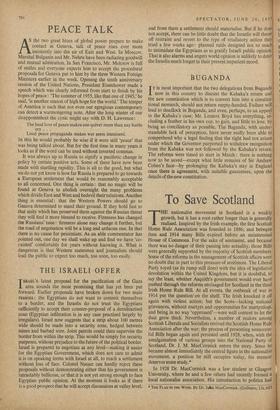PEACE TALK
AS the two great blocs of global power prepare to make contact at Geneva, talk of peace rises ever more insistently into the air of East and West. In Moscow, Marshal Bulganin and Mr. Nehru have been radiating goodwill and mutual admiration. In San Francisco, Mr. Molotov is full of smiles and everyone expects him to accept the procedural proposals for Geneva put to him by the three Western Foreign Ministers earlier in the week. Opening the tenth anniversary session of the United Nations, President Eisenhower made a speech which was clearly informed from start to finish by his hopes of peace: 'The summer of 1955, like that one of 1945: he said. 'is another season of high hope for the world.' The temper of America is such that not even our egregious contemporary can detect a warmongering note. After the long winter of our disappointnient the cynic might say with D. H. Lawrence: The loud love of peace makes one quiver more than any battle cry . . . Loud peace propaganda makes war seem imminent.
In this he would probably be wise if it were still 'peace' that was being talked about. But for the first time in many years it looks as if the word can be used without inverted commas.
It was always up to Russia to signify a pacifistic change in policy by certain positive acts. Some of these have now been made with startling rapidity. This is all to the good, but what we do not yet know is how far Russia is prepared to go towards a European settlement that would be reasonably acceptable to all concerned. One thing is certain: that no magic will be found at Geneva to abolish overnight the many problems which divide East and West and bedevil their relations. Another thing is essential : that the Western Powers should go to Geneva determined to stand their ground. If they hold fast to that unity which has preserved them against the Russian threat they will find it more blessed to receive. Firmness has changed the Russians'' tune: firmness alone may change it further, but the road of negotiation will be a long and arduous one. In that there is no cause for pessimism. As an able commentator has pointed out, one day we shall wake up and find we have 'co- existed' comfortably for years without knowing it. What is dangerous is that Western statesmen and journalists should lead the public to expect too much, too soon, too easily.

















































 Previous page
Previous page